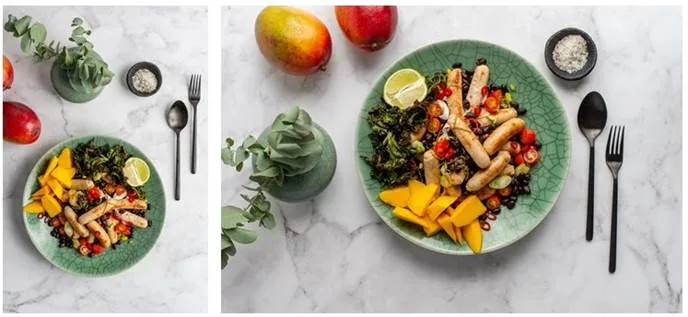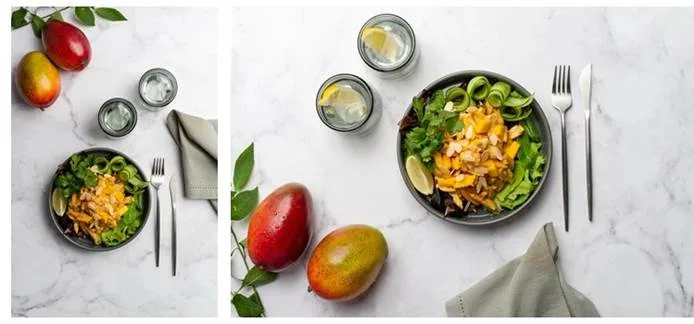Nature is a magnificent thing, producing fresh foods that are a treasure to the tastebuds, their golden glory an inspiration for the cook and a wealth of delight for anyone feasting on them, especially in the case of delicious late season mangoes.
In South Africa, the red, yellow, and green hues of fresh mangoes perfectly reflect the fading trail of the country’s summer and the coming of a magnificent autumn. In any case, whether you’re in South Africa or the United States, adding mangoes to your diet won’t just be a treat for your tastebuds, but it will also be a treat for your health.
6 Health Benefits of Mangoes
1. Help with digestive health

Photo by Kampus Production from Pexels
If you want to improve your digestive health, then you need to make sure that you’re getting enough fibre. Luckily for you, fibre is something that you can find in mangoes.
Not only have the leaves of mangoes been found to possess properties that can help combat diarrhoea, but one study revealed that mangoes help to significantly improve the symptoms of patients dealing with chronic constipation.
2. Healthy skin and hair
Mangoes contain good doses of both vitamins A and C, which we know are the secret to healthy and happy skin and hair. In fact, one study published in Nutrients found that postmenopausal women who ate half a cup of Ataulfo mangoes, four times a week, experienced a 23% reduction in deep wrinkles after two months. It should be mentioned that the study was supported by the Mango Board, but that doesn’t mean that mangoes don’t possess the necessary nutrients to help your skin and health.
Vitamin C not only encourages collagen production, which you need if you want plump and firm skin, but it also offers antioxidant protection from free radicals. It also helps to keep your locks healthy by encouraging hair growth.
Vitamin A, on the other end, helps your skin by protecting it from sun damage and by maintaining the skin barrier. It also keeps your hair happy by moisturizing your scalp, which can encourage healthy growing hair.
3. Great for your heart
With cardiovascular disease being the leading cause of death worldwide, eating your heart health is something that we should all get into the habit of doing.
Mangoes contain both magnesium and potassium, and both of these nutrients have been found to maintain lower blood pressure levels. In fact, research presented by the University of California, Davis showed that two cups of mangoes a day had beneficial effects on blood pressure in healthy postmenopausal women.
4. Better eye health
In addition to vitamin A, mangoes also contain the antioxidants lutein and zeaxanthin, and all three of these nutrients can help ensure that you have perfect vision.
Lutein and zeaxanthin help to protect your eyes from sunlight and blue light, and in doing so, reduce the risk of macular degeneration, which is an eye condition that can lead to blindness.
5. Immune boost
After 2020, I’m sure that we’re all looking for ways to keep our immune system healthy and strong. Thankfully, eating more mangoes can help you do this.
For one, as mentioned, mangoes are rich in vitamin A, which is great for your immune system. According to researchers, vitamin A is known as “an anti-inflammation vitamin because of its critical role in enhancing immune function” (1).
Mangoes also contain vitamin C, which we know is an immune-strengthening nutrient as it helps the body produce white blood cells which help fight off diseases and infections.
Mango and Chicken Chipolata Salad with Black Beans
Serves 4
Preparation time: 30 minutes

Mango and Chicken Chipolata Salad with Black Beans
Ingredients
- 1 ripe mango, chopped
- 100 g cherry tomatoes, halved
- 1 red chili, seeded and finely chopped
- 2 spring onions, finely chopped
- 1 tin black beans, drained and rinsed
- 100 g kale leaves, lightly fried until crispy
- 200 g chicken chipolatas, grilled
- Juice and zest of 1 lime
- 4 tablespoons olive oil
- Pinch of sea salt flakes, or to taste
- Freshly ground black pepper, to taste
Method:
1. Add all the ingredients to a serving bowl and stir to combine and serve.
Chicken and Mango Coronation Salad
Serves 4
Preparation time: 30 minutes

Chicken and Mango Coronation Salad
Ingredients
- 4 tablespoons olive oil
- 1 tablespoon fresh ginger, grated
- 1 tablespoon mild or hot curry powder
- 4 tablespoons mango chutney
- ½ cup dried apricots, sliced
- 1 cup mayonnaise
- 1 tablespoon Worcestershire sauce
- 4 chicken breasts, thinly sliced
- Salt and freshly ground black pepper, to taste
- 1 mango, thinly sliced
- 1 packet salad leaves
- ½ cucumber, cut into ribbons
- 100 g flaked almonds, toasted
- 1 fresh lime, halved to serve
- ½ cup fresh coriander, chopped
Method:
1. In a small frying pan, heat the oil and sauté the ginger and curry powder, stirring until fragrant, for about a minute. Spoon into a mixing bowl and add the chutney, apricots, mayonnaise, and Worcestershire sauce.
2. Brush the chicken with a little oil and season well. Lightly fry until golden and cooked.
3. Add the chicken to the chutney mixture and mix well to combine.
4. Serve the chicken with the mango, salad leaves, cucumber, almonds, lime, and sprinkle with the coriander.
References
1. Huang, Z., Liu, Y., Qi, G., Brand, D., & Zheng, S. (2018). Role of Vitamin A in the Immune System. Journal of Clinical Medicine, 7(9), 258. https://doi.org/10.3390/jcm7090258
2. Yakubu, M.T., Salimon, S.S. (2015). Antidiarrhoeal activity of aqueous extract of Mangifera indica L. leaves in female albino rats, Journal of Ethnopharmacology, Volume 163, Pages 135-141, ISSN 0378-8741, https://doi.org/10.1016/j.jep.2014.12.060.
3. Fam, V.W., et al. (2020) Prospective Evaluation of Mango Fruit Intake on Facial Wrinkles and Erythema in Postmenopausal Women: A Randomized Clinical Pilot Study. Nutrients. doi.org/10.3390/nu12113381





![women [longevity live]](https://longevitylive.com/wp-content/uploads/2020/01/photo-of-women-walking-down-the-street-1116984-100x100.jpg)










